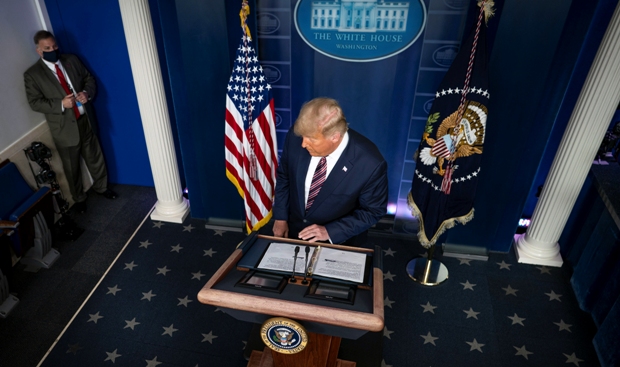Who’s going to tell him? Republicans shy from asking trump to concede
By Catie Edmondson
WASHINGTON — Since he was elected, President Donald Trump’s relationships with Republican lawmakers on Capitol Hill have mostly fallen into one of two categories: the unbreakable bond with his most ardent followers who defend him at all costs, and the tenuous, strained alliance with the rest who share his agenda but often cringe privately at his language and tactics.
Neither group is particularly well-suited for the chore of trying to persuade Trump, who refuses to concede the election, that it is time to step aside — or at the very least, to stop spreading claims about the integrity of the nation’s elections that are contrary to considerable evidence. And there is little chance that Trump, who has been perplexed and sometimes enraged by the Republican institutionalists who might normally be expected to play such a role, would listen if they did.
The dynamic helps explain why, days after President-elect Joe Biden was declared the winner of the election, even Sen. Mitch McConnell of Kentucky, the majority leader, was unwilling to recognize the result. Instead, senators have tiptoed around — or in some cases blindly run past — the reality of Trump’s loss and the lack of evidence to suggest widespread election fraud or improprieties that could reverse that result.
“There is no bipartisanship to speak of, in terms of how many members are willing to speak up — and would it matter to him? Would he listen?” said William Cohen, a former senator and House member from Maine who was one of the first Republicans to break from his party and support the impeachment of President Richard Nixon. “Trump doesn’t care a whit about the House or Senate, and he rules by fear. He still can inflame his supporters — there are 70 million out there. He still carries that fear factor.”
By Monday evening, a club of only a few Republican senators known for their distaste for Trump — Mitt Romney of Utah, Ben Sasse of Nebraska, Susan Collins of Maine and Lisa Murkowski of Alaska — had acknowledged Biden’s victory.
McConnell, who is poised to be the top Republican in Washington during the coming Biden administration, threw his support behind Trump, declining to recognize Biden’s victory as he argued Trump was “100% within his rights” to challenge the outcome.
Far from attempting to influence the president’s thinking, most Republicans have gone out of their way to avoid seeming to dictate what he should do.
“I look forward to the president dealing with this however he needs to deal with it,” Sen. Roy Blunt, a Missouri Republican on McConnell’s leadership team, said on ABC’s ;This Week; on Sunday (8), even as he noted that it “seems unlikely” that the outcome would change based on Trump’s legal claims.
Some of the Trump’s acolytes, on the other hand, have rushed to advance his baseless theories of fraud. Sens. Kelly Loeffler and David Perdue of Georgia, both of whom are facing runoff elections in January, demanded the resignation of their state’s top election official, a fellow Republican, after he said there was no evidence of widespread fraud in the state’s elections.
Rep. Kevin McCarthy of California, the Republican leader, also insisted that Trump was right to contest the results of the election.
“Every legal challenge must be heard,” McCarthy said. “Then and only then does America decide who won the race.”
In 1974, as Nixon faced the Watergate scandal and the strong likelihood of impeachment and conviction, a cadre of powerful Republican lawmakers marched to the White House and one by one, naming lawmakers in their own party who were prepared to vote to convict him, told him it was time for him to go. The message was clear, and Nixon announced his resignation the next day.
Expect no such reckoning for Trump, said Timothy Naftali, founding director of the Richard Nixon Presidential Library and Museum and a professor at New York University.
“It’s very difficult for Republicans whose leader got 71 million votes, the most by any Republican standard-bearer ever, to simply just turn their backs on him,” Naftali said. “The issue is now not so much Trump as loyalty to Trumpism. And I think that’s why you see the contortions now. If you’re a Republican and you get this wrong, you’re going to be primaried out.”
There is a more immediate concern for the party, too. With Perdue and Loeffler facing elections whose outcomes are likely to determine control of the Senate, Republicans are reluctant to do anything to dampen the enthusiasm of their conservative base. Any hint that leaders were prodding Trump to exit the stage could provoke a Twitter rampage from the president that could turn his supporters against the party at a critical time.
“The Republican Party haemorrhaged seats in 1974 after Watergate, after the near-impeachment of a Republican president,” Naftali said, while they appear on track to gain House seats this year after Democrats’ impeachment of Trump. “So what is the lesson for politicos? The lesson is not to run away from Trump.”
Still, some Republicans have argued in recent days that it is crucial for members of their party to push back in a measured way against the president’s unsubstantiated claims of widespread voter fraud.
On Monday, 31 former Republican members of Congress — many of them outspoken critics of the president — denounced Trump’s allegations in an open letter that called on him to accept the election results.
“We believe the statements by President Trump alleging fraud in the election are efforts to undermine the legitimacy of the election and are unacceptable,” wrote the group, led by former Rep. Tom Coleman of Missouri. “Every vote should be counted and the final outcome accepted by the participants because public confidence in the outcome of our elections is a bedrock of our democracy.”
-New York Times


